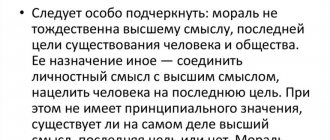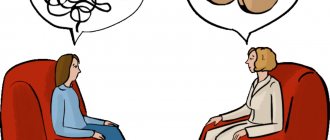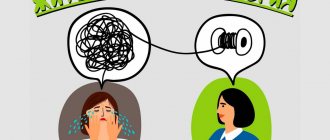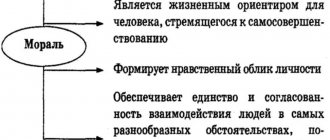Moral standards are similar to legal ones. The thing is that they act as the main mechanism by which human behavior is formed. Thus, moral norms today are unwritten rules and laws that have developed over several millennia of human existence. In the legal field, laws are legally enshrined.
Moral culture
Moral norms and values are the practical embodiment of morality. Their peculiarity lies in the fact that they determine the consciousness and characteristics of people’s behavior in all spheres of life: everyday life, family, professional activity, interpersonal relationships.
Moral standards are a set of rules defining human behavior, the violation of which causes harm to society or a group of people. They are formulated in the form of a specific set of actions. For example:
- you need to give way to those who are older;
- say hello when meeting another person;
- be generous and protect those who are weaker;
- arrive on time;
- speak culturally and politely;
- wear this or that clothes, etc.
(moral) is the simplest element of moral
relations
, in which a person and a society exist between themselves.
In these relationships, a person submits to various forms of obligation, which are reflected in the corresponding forms of moral consciousness
.
So, in each specific situation a person must perform a certain act ( Duty
);
in all cases must act in accordance with the norms
of behavior common to all;
at the same time, he must proceed from those assessments
to which the actions he committed in the past were subjected to;
qualities
in oneself ;
principles
in all their life activities ;
strive to achieve moral perfection; subordinate one’s activities to the ultimate goal of establishing a just social order ( Ideal
), etc.
All these T. to the individual, as well as to social reality, which people strive to conform to their moral ideas, ultimately reflect an objective socio-historical necessity. But this necessity takes on a different form in morality, depending on how moral requirements are formulated.
Along with various forms of manifestation, moral principles have a number of common features. Firstly, they are normative, that is, they are mandatory for execution regardless of what specific tasks are being pursued in a given case (in contrast to the rules of various kinds of instructions - “in order to achieve such and such a result, you should do such and such”). Secondly, moral T. have an impersonal, extra-subjective character, that is, they are not based on the will of someone. subject (in contrast, for example, from the rules of law, which are legitimized by the state).
Whoever formulates moral T. in this or that case, it does not speak on his own behalf, but expresses something objective, the laws of social life. Thirdly, this T. always has a universal meaning, that is, it applies equally to all people, regardless of their special position, professional responsibilities, or organizational affiliation.
Any special duties and tasks are, at the same time, moral T. only insofar as they manifest in themselves something obligatory for all people ( Professional ethics
). Fourthly, moral principles have a universal character: each assessment or prescription of morality reflects not just a certain class. one interest, need or goal, but the most diverse needs and interests of a person, classes, society, humanity.
This is especially clear in communist morality, which is deeply alien to any kind of utilitarianism, opportunism, or one-sidedness in understanding the goals and interests of man. Since morality as a whole is composed of moralities that take on the most varied forms, their features are specific features of morality in general.
Back | Subject Index | Forward
The foundation for building a healthy personality
Spiritual and moral norms and values constitute the image of a person who is perfect in the sense of conforming to the pattern of piety. This is the portrait you should strive for. In this way, the ultimate goals of an action are expressed. An image such as Jesus in Christianity is used as an ideal. He tried to instill justice in human hearts and was a great martyr.
Moral rules and norms play the role of personal life guidelines for a particular person. A personality sets its own goals, in which its positive or negative side is manifested. Most people strive for happiness, freedom, and knowledge of the meaning of life. Moral standards help them regulate their moral behavior, thoughts and feelings.
Morality functions in society as a combination of three structural elements, each of which represents one aspect of morality. These elements are moral activity, moral attitudes and moral consciousness.
Morality past and present
These phenomena began to appear quite a long time ago. Each generation and community of people formed their own understanding of good and evil, their own ways of interpreting moral norms.
If we turn to traditional societies, we will see that there the moral character was considered as an unchangeable phenomenon, actually accepted in the absence of freedom of choice. A person of that time could not make a choice between accepting and not accepting the prevailing trends; he had to unconditionally follow them.
Nowadays, in contrast to legal norms, moral norms are more considered as recommendations for achieving happiness for oneself and the surrounding society. If earlier morality was defined as something given from above, prescribed by the gods themselves, today it is something similar to an unspoken social contract that is desirable to follow. But if you disobey, in fact, you can only be condemned, but not held to real responsibility.
You can accept moral laws (for your own good, because they are useful fertilizer for the sprout of a happy soul), or reject them, but this will remain on your conscience. In any case, the entire society revolves around moral standards, and without them its functioning would be incomplete.
Morality yesterday and today
The moral norms of society arose quite a long time ago. Each generation of humanity interpreted the understanding of good and evil in its own way. And also interpreted the norms of behavior in its own way. In a traditional society, we see the moral character unchanged. That is. A person of the past had no choice to accept or not accept these moral standards of humanity. He had to abide by them unconditionally.
Today, a person observes or considers ethical norms as recommendations for achieving good for himself and others. For the most part, modern society no longer observes moral laws, but legal ones.
Previously, morality was defined as a set of rules prescribed by God. However, today they are presented as a social contract, the terms of which are desirable to be observed. If a modern person violates moral standards, he will not be held accountable, but will only be condemned at a family dinner.
Adopting moral laws for oneself is everyone’s choice. But remember that they will be an excellent fertilizer for the sprout of a harmonious soul. You can reject them, then do not expect a human attitude towards your person. However, it so happens that humanity and all society revolves around morality and ethics. And without them, the modern generation of people would not have achieved humanity and virtue.
Diversity of moral standards
All moral norms and principles can be divided into two groups: requirements and permissions. Requirements include obligations and natural duties. Permissions can also be divided into indifferent and supererogatory.
There is social morality, which implies the most unified framework. There is an unspoken set of rules that operates in a particular country, company, organization or family. There are also attitudes according to which an individual person builds his line of behavior.
In order to understand moral culture not only in theory, but also in practice, you need to do the right things that others will accept and approve of.
Digital library
Humanities / Professional ethics / 7.1. MORAL REQUIREMENTS FOR THE ACTIVITIES OF THE JUDICIARY
Reinforced in Art. 10 of the Constitution of the Russian Federation, the principle of separation of powers and independence of the judiciary, along with the legislative and executive powers, creates a normative and ideological basis for the formulation of moral requirements for representatives of the judiciary. The judiciary, acting in the sphere of social and interpersonal conflicts, forming a necessary component in the system of “checks” and “balances”, must meet high moral standards and meet the expectations of society.
The most important requirement for the activities of the judiciary is justice. Society and every person only needs a fair court, one that stands on the side of the truth, actively defends it and expresses it in its decisions.
In the criminal process, where we are talking about crime and punishment, about protecting the most important benefits of the individual from crime, justice takes on increased importance. An unfair trial can cause great harm to both an individual and an entire society. An unfair trial has always been condemned by society. Many negative phenomena were associated with his activities.
The judiciary is assessed as fair when it applies laws recognized by society as fair, resolves cases by establishing the truth, reliably ascertaining their factual circumstances, and makes decisions in accordance with the known facts and the requirements of the law. A fair trial is a court where the guilty are reasonably subjected to deserved punishment, and the innocent are necessarily acquitted.
The requirement for the judiciary to be fair applies not only to its decisions of a final nature, but also to all its activities from the moment the case comes before it. Justice is expressed both in ensuring the equality of all those affected by judicial activities, and in respecting the rights of persons participating in the case, and in the validity and legality of interim decisions of a “procedural” nature.
The judiciary must be equal for everyone. This moral requirement essentially expresses the egalitarian aspect of justice. However, the requirement to ensure equality in court is so important that it is specifically highlighted in law and appears in the moral consciousness of society.
The requirement of equality in the courts of Russia has been legislatively enshrined for a long time, proclaimed in the normative acts of Peter I, Catherine II, Alexander II, and in constitutions adopted at different times. However, ensuring real equality in court, equal real opportunities to defend their rights before the court for people occupying different social, official, and property positions remains a problem today.
The judiciary must be objective and impartial. The court is biased, biased and incapable of administering justice. It distorts the very idea of justice and can turn into an instrument of arbitrariness. Particularly dangerous is bias under the influence of any forces seeking to influence judges.
The impartiality of the judiciary, manifested in the absence of commitment to any of the parties, the ability to equally treat their claims and personality and act only in the interests of truth and justice on the basis of law and conscience, is a fundamental requirement of a moral and legal nature.
A judiciary that is unable or unwilling to act impartially does not deserve public confidence. Those who personify it, under these conditions, are deprived of authority and the moral right to judge others.
The judiciary must be competent. Competence can be characterized in one of its meanings as the high professionalism of judges, their deep knowledge of the laws, the requirements of professional ethics, strict adherence to them, the ability to correctly understand this or that, sometimes complex and confusing situation. It also includes extensive life experience, experience in applying laws, and legal activities even before assuming the duties of a judge. A judge must have a higher legal education. However, without constant improvement of their knowledge, improvement of legal and general culture, a judge will inevitably fall behind the requirements that a representative of the judiciary must meet and become incompetent.
Moral relations between judges arise in the process of judicial proceedings carried out by a collegial court. Trial is the decisive stage of the criminal process, where criminal justice is directly carried out. It is at this stage, in a public process, that a criminal case is examined with the participation of the parties, and decisions are made about the fate of the defendant, about the validity of the claims of the victim and the civil plaintiff for the restoration of violated rights.
For a long period, criminal proceedings were carried out on a collegial basis. No criminal case, from cases involving serious crimes to cases that could result in a minor fine or public censure, could be tried alone. The court of first instance acted with only one judge and two lay judges.
The differentiation of the judicial procedure in recent years has entailed a change in the composition of the court administering justice in criminal cases. Currently, the following may conduct a trial and pronounce a verdict:
· one professional judge;
· three professional judges;
· one professional judge and twelve jurors.
Criminal cases involving crimes for which the criminal law provides for a maximum penalty of imprisonment for a term of over fifteen years or a more severe penalty are considered by a panel of three judges.
In both collegial and individual proceedings in criminal cases, the judge presides over the court hearing ex-officio. And it is he who is obliged to ensure both strict compliance with the law and a highly moral course and result of the trial. Of course, some of the moral issues that have to be resolved in a collegiate court are different from those that face a single judge. At the same time, the management of the court hearing within the limits of the procedural procedure prescribed by law invariably remains with the presiding officer, who enters into moral relations with the parties, other persons participating in the case, and in a collegial hearing of the case, also with judges, lay assessors or jurors.
In relationships within the professional panel of judges, certain moral standards developed by many years of practice must be observed. The sentencing procedure regulated by law helps to ensure the equality of all judges.
The pronouncement of the verdict is preceded by a conference of judges, which takes place in the secrecy of the meeting. The presiding judge puts before the court the questions forming the essence of the verdict, the list and sequence of which are determined by law. Deviation from this requirement not only violates the legal procedure for making a decision, but can also give rise to moral conflicts and indicate disrespect of the presiding judge for the opinions of other judges.
All issues are resolved by a simple majority of votes. If the opinion of the presiding officer differs from the opinion of one or both judges during the discussion of a particular issue, the presiding officer, of course, is not deprived of the right to convince them of the correctness of his opinion. But this must be done in an extremely tactful manner, with arguments arising from the data of the trial. Any pressure on other judges is unacceptable.
None of the judges has the right to refrain from expressing their opinion when rendering a sentence. This norm of the law contains a moral meaning: the judge, called upon to decide the fate of the defendant, does not have the right to evade moral responsibility for the decision made, to “wash his hands.”
The presiding officer is the last to cast his vote. Compliance with this rule is intended to ensure the freedom of expression of all judges participating in the process. The presiding officer, having become convinced during the discussion of a particular issue that he will remain in the minority, does not have the right to avoid voting on it.
The moral duty of the judge presiding over the case is to create in the panel of judges an atmosphere of cooperation, mutual respect, principled and responsible attitude of each to their duties, when all issues are resolved on the basis of internal conviction with the equality of all three judges.
When considering a criminal case with the participation of jurors, the relationship between the judge presiding over the case and the jurors is built on the basis of the division of their functions while guaranteeing the freedom of expression of the jurors and the utmost objectivity of the presiding judge in the conduct of the trial.
The Criminal Procedure Code of the Russian Federation obliges the presiding officer to make a brief introductory speech, in which, in particular, he speaks about the tasks of the jurors and the conditions for their participation in the case. The presiding judge alone makes a decision on the release of jurors who have appeared in court from participation in the case, as well as on challenges and self-recusations. It is the duty of the presiding officer to ensure that the composition of the jury is such that it guarantees their complete impartiality and ability to reach an objective verdict. Reasoned and unmotivated challenges are satisfied so that the panel of jurors does not turn out to be biased. During the trial, it must be ensured that each juror can exercise the rights granted to him by law.
The presiding judge is obliged to ensure that jurors do not communicate with the parties and persons participating in the case outside of the established procedure, and to remove a juror from participation in the case in the case where there is reason to believe that this juror has lost objectivity as a result of unlawful influence exerted on him. impact.
During a judicial investigation, jurors have the right to ask questions to the defendant, victim, witnesses and experts through the presiding judge. The presiding judge shall not ask jurors such questions as are not relevant to the case, are leading or offensive.
When posing questions to jurors, the final wording of the questions in the question sheet belongs to the presiding judge.
This requires special attention and responsibility, since inaccurate formulation of questions or their bias may lead to an unfair verdict by the jury.
The presiding officer's parting words must be objective. The law prohibits the presiding officer from expressing his opinion in any form on issues put before the jury. The moral problem here is that the presiding officer pronounces a parting word in conditions when he himself has already formed a conviction on the issue of the guilt or innocence of the defendant. While informing the jurors of the information necessary to make the right decision, including recalling the evidence examined in court, the judge, however, does not have the right to even indirectly guide them to any conclusions.
In a jury trial, the presiding judge is not exempt from moral responsibility for the fairness of the decision on the guilt or innocence of the defendant. He is obliged to dismiss the jury, recognizing that they returned a guilty verdict against an innocent person. The judge also has the right to pronounce an acquittal, recognizing that the defendant’s act does not constitute a crime, although the jury returned a guilty verdict.
When considering a case alone, the judge does not have the opportunity to use the opinions and advice of other judges when making decisions during the trial and when rendering a sentence.
All moral responsibility for the objective conduct of the trial and the fairness of the verdict lies with him alone.
The moral relations of the court and the participants in the trial, based on the law, determine the behavior of the judges, and especially the presiding judge in the case, in communicating with the defendant, his defense attorney, the victim, the prosecutor and other persons.
The presiding judge and other judges are required to conduct the entire trial and resolve the criminal case absolutely impartially. Judges' prejudice against the defendant or victim, or other persons involved in the case, is a sure path to a miscarriage of justice. It is illegal and immoral, since the judge deviates from the requirements of impartiality and objectivity imposed on him by society.
The position of the judge is such that before the verdict is passed, he does not have the right to express his opinion regarding the guilt or innocence of the defendant. Otherwise, he is subject to justified challenge. However, it is no less important that the judge not only does not “publish” in one form or another his attitude to the case, his position regarding the resolution of issues that form the essence of the verdict, but is also internally free from prejudice, ready to perceive everything that happens in court without preferences, objectively.
The judge presiding over the case, as well as other judges, must be equally attentive to the petitions and statements of all participants in the trial, listen to them and raise the questions raised for resolution by the court.
Judges should not show their sympathy or antipathy towards any of the participants in the trial, for example, be emphatically attentive to the victim and ignore the appeals or statements of the defendant, demonstrating distrust of him. In court, it is necessary to create an atmosphere of procedural equality of the parties, obvious to all those present.
In the preparatory part of the court session, the court takes measures to ensure the impartial composition of the court and participants in the trial, eliminating those who are subject to challenge. Here, the rights of the defendant, the victim, and other persons are explained, which cannot be formal.
It is necessary that everyone truly understands what opportunities the law provides him with to protect his interests. When allowing motions submitted before the start of a judicial investigation, the court must be ready to satisfy them if they are stated to clarify circumstances essential to the case.
During the judicial investigation, the actions and behavior of the presiding judge, other judges and people's assessors are subordinated to one goal - to establish the truth in the case through a comprehensive, complete and objective examination of the evidence. At the same time, both in content and in form, the court’s actions must comply with procedural and moral standards.
After the indictment is announced, the presiding officer asks the defendant whether he understands the charge, explains to the defendant, if necessary, the essence of the charge and asks whether he pleads guilty. At the request of the defendant, the presiding officer provides him with the opportunity to motivate his answer.
The judge’s duty is to make sure that the defendant really understands what he is accused of, and his answer to admit or not admit his guilt is based on a correct understanding of the essence of the charge, and that the defendant’s legal ignorance did not determine his erroneous answer.
A serious drawback in conducting a judicial investigation is an uncritical approach to the materials available in the case, collected during the inquiry or preliminary investigation. It indicates a formal attitude towards the performance of the duties of a judge and can lead to the most serious mistakes - the conviction of the innocent, as well as unfairly severe punishment of the truly guilty. Therefore, the actions of the presiding officer during a judicial investigation should be based on the need to ensure maximum objectivity in the investigation of the circumstances of the case, with equality of the parties to the prosecution and defense.
The presiding judge should not insist on obtaining evidence from the defendant consistent with the prosecution's version of the indictment. If the defendant changes his position in relation to the accusation, compared to the position at the preliminary investigation (instead of admitting guilt - denial), and the associated change in testimony, the duty of the court is to find out the real reasons for this and carefully check which testimony is consistent reality. Therefore, judges should not convince the defendant of the advisability of admitting his guilt. If the defendant is not guilty and his testimony at the preliminary investigation does not correspond to the actual state of affairs, but was the result of an error, delusion or dishonest conduct of the investigation, then his testimony at the trial must be used to establish the truth and rehabilitate the defendant. If he previously gave truthful testimony, but in court refused it and began to report false information, then the duty of the court is to carefully listen to the defendant’s version, to understand the truth or falsity of certain testimony, and to collect evidence during the judicial investigation that provides grounds for an unmistakable conclusion.
If the defendant changes his position in relation to the accusation, compared to the position at the preliminary investigation, he must be given the opportunity to explain the reasons for this and give detailed testimony about the accusation and the circumstances of the case known to him in the form that the defendant himself wishes to do.
Finding out the reason for the defendant's change of position and reading out the testimony given by him during the preliminary investigation should be done only after the defendant has been given the opportunity to fully present his version of the circumstances of the case.
You cannot persuade the defendant to return to his previous testimony, remind him in this regard of the importance of sincere repentance for mitigating responsibility, etc.
When interrogating the defendant and during the judicial investigation in general, it is necessary to strive to awaken the conscience of the defendant, which can lead to his sincere repentance.
In an adversarial process, convicting the defendant of a crime is the responsibility of the prosecutor, not the judge or the court. A judge who sets “traps” for the defendant behaves biased, biased, and immoral.
The presiding officer is obliged to equally carefully listen to the testimony of all interrogated persons, regardless of whether he considers this testimony to be true or false, corresponding to reality or the result of a mistake. In this case, each interrogated person should be given the opportunity to freely present his testimony, and questions are asked, as a rule, at the end of such a story.
All leading questions posed by any of the participants in the trial are subject to unconditional and immediate rejection by the presiding judge. The judges themselves, especially, do not have the right to pose leading questions in any form.
Interrogation in court in a public trial always causes an aggravation of the feelings and emotions of the interrogated person. Therefore, special tact and extreme attentiveness to the state of the person being interrogated are required from the presiding officer.
During a judicial investigation in an open court session, the disclosure of information about the intimate aspects of the lives of certain persons, as well as the disclosure of personal correspondence, must be excluded.
Finding out information about the identity and occupation of witnesses and victims, the nature of their relationships with the defendant and other persons is carried out only within certain limits. The private life of citizens is protected by law. The court can intervene in this area only when it is really necessary to clarify the essential circumstances of the case. This requirement, of course, also applies to participants in legal proceedings.
During the court arguments and the last word of the defendant, the presiding judge and the jurors will carefully listen to everything that the participants in the trial say. Using his leadership position, the presiding officer suppresses attempts to violate ethical standards in communication, in a dispute between participants in judicial debates, rudeness or tactlessness towards someone. In this part of the trial, you cannot be distracted from what is happening in court, take notes on other issues, leaf through the case materials, etc.
During the entire trial, the presiding officer is obliged to show tact, restraint, be extremely collected, and follow the rules of judicial ethics in an exemplary manner. At the same time, he must take measures to ensure that, in the process of communication with each other, all participants in the trial comply with ethical standards and rules of conduct in a government institution. Rudeness, tactlessness, and attempts to humiliate someone’s dignity must be stopped immediately.
The presiding officer must behave formally and at the same time politely, and be attentive to everyone with whom he comes into contact. The behavior of a judge should not be dry, callous, or frivolous or playful. Every crime that the court examines has brought grief and moral shock to someone. The judge will probably be remembered for the rest of his life by the defendant, his relatives, the victim and other participants in the process, and his behavior will be carefully observed by those in the courtroom. In their eyes, he is a judge from whom they expect an intelligent and conscientious investigation of the case and its fair resolution. And the judge is obliged to justify these hopes with all his behavior.
A prosecutor supporting the state prosecution participates in the court hearing. In this activity, he is guided by the law and moral standards that determine the essence of his activity in court.
The ethical aspects of maintaining public prosecution will be discussed below. Here we should recall only the general principles of the activities of the public prosecutor:
· full assistance to the court in a comprehensive, complete and objective examination of the circumstances of the case;
· intolerance to violations of legal and moral norms;
· impeccable sense of justice;
· integrity, persistence in exposing the culprit with maximum objectivity;
· the obligation to renounce the accusation if it is not confirmed during the judicial investigation;
· emphasized respect for the court as a judicial body and respect for the dignity of all persons involved in the case;
· correctness, sense of tact, exemplary compliance with the rules of conduct in court.
When pronouncing a sentence, the judge, whether he alone decides the case or is part of the panel, bears full responsibility for the fate of the defendant, for an error-free, fair resolution of the case. Here the leading role is played by the conscience of the judge, evaluating the evidence according to his inner conviction, making a decision on conviction or acquittal, on punishment if the defendant is found guilty. This activity should accumulate the best moral qualities of the judge, which have already been mentioned: understanding of the social significance of the decision being made and an increased sense of personal duty, objectivity, impartiality, fairness, honesty, humanity, integrity, etc.
A judge does not have the right to avoid making a decision on a case either by abstaining from voting or by sending the case for additional investigation when it obviously does not bring anything new. The law gave him the right and at the same time placed on him the burden of the final decision. And it will be fair only when all judges, with a full sense of responsibility, fulfill their professional moral duty.
Perhaps the importance of morality is exaggerated?
It may seem that following moral standards shackles a person into narrow boundaries. However, we do not consider ourselves prisoners when using the instructions for this or that radio device. Moral norms are the same scheme that helps us build our lives correctly, without coming into conflict with our conscience.
Moral norms for the most part coincide with legal norms. But there are situations when morality and law come into conflict. Let us examine this issue using the example of the “thou shalt not steal” norm. Let's try to ask the question “Why does this or that person never steal?” In the case where the basis is fear of judgment, the motive cannot be called moral. But if a person does not steal, based on the belief that theft is bad, then the act is based on moral values. But in life it happens that someone considers it his moral duty to do something that, from a legal point of view, is a violation of the law (for example, a person decides to steal medicine in order to save the life of a loved one).
The Importance of Moral Education
You should not expect that the moral environment will develop on its own. It also needs to be built, learned, that is, worked on oneself. It’s just that, along with mathematics and the Russian language, schoolchildren do not study the laws of morality. And, getting into society, people can sometimes feel as helpless and defenseless as if they went to the blackboard in 1st grade and were forced to solve an equation that they had never seen before.
So all the words that good behavior fetters, enslaves and makes a slave out of a person are true only if moral standards are perverted and adjusted to the material interests of one or another group of people.
Moral requirements for a lawyer
Ministry of Education and Science of the Russian Federation
Federal State Budgetary Educational Institution
Higher professional education
"Udmurt State University"
Institute of Law, Social Management and Security
Department of Theory and History of State and Law
ABSTRACT
by discipline
"Professional Ethics"
On the topic
“Moral requirements for a lawyer”
| Part-time (full-time) student Tretyakova Anastasia Sergeevna Groups: ZSVB-030900-12 Teacher: Ignatov S.D. |
Izhevsk, 2015
Introduction
The term “professional ethics” is usually used to denote not so much a branch of ethical theory, but a kind of moral code of people of a certain profession. These are, for example, the “Hippocratic Oath” and the Code of Honor of Judges of the Russian Federation.
Professional ethics are determined by the characteristics of certain professions, corporate interests, and professional culture. People performing the same or similar professional functions develop specific traditions, unite on the basis of professional solidarity, and maintain the reputation of their social group.
Every legal profession has its own moral issues. But among all professions, one can distinguish a group of those in which they arise especially often, which require increased attention to the moral side of the functions performed. Professional ethics is important primarily for professions whose object is a person. Where representatives of a certain profession, due to its specificity, are in constant or even continuous communication with other people, associated with the impact on their inner world, destiny, and moral relationships, there are specific “moral codes” of people of these professions and specialties. These are the ethics of a teacher, the ethics of a doctor, the ethics of a judge.
Professional ethics is a set of rules of conduct for a certain social group that ensures the moral nature of relationships conditioned or associated with professional activities, as well as a branch of science that studies the specifics of manifestations of morality in various types of activities.
Features of the legal profession and their moral significance
The specifics of a lawyer’s professional activity predetermine the need to distinguish in legal ethics judicial, prosecutorial, investigative, advocacy ethics, ethics of employees of internal affairs and security agencies, legal services of enterprises, joint-stock companies and firms, legal scholars and teachers of law schools. Further specialization and integration of legal activities will lead to new varieties of legal ethics (lawyer-programmer and so on). As can be seen from the above, legal ethics cannot be reduced only to judicial ethics, understood as “a broad, generic concept that covers the activities of not only judges, but also prosecutors, investigators, persons conducting inquiries, defense lawyers and lawyers representing victims, that is all persons promoting justice." The authors of this statement proceeded from the priority place of the court in the system of law enforcement bodies of the state, from the fact that the judicial power is one of the branches of state power, and also from the fact that justice in Russia is carried out only by the court (Articles 10 and 118 of the Constitution of the Russian Federation), and all activities preceding the trial “work for the court”, are carried out for the sake of administering justice in a particular case. This common goal of the activity carried out by all these bodies, the similarity of the professional and moral requirements imposed on its subjects, led to the formation of such a consolidating concept, which is judicial ethics, defined as “the science of the moral principles of judicial and related activities.”
But with all the well-deserved respect for the court as a very important body of the entire law enforcement system of the state for the protection of the rights, freedoms and interests of citizens and legal entities, judicial activity still cannot cover all aspects of multifaceted legal activity. Because of this, judicial ethics, for all its high importance, is only a sub-branch of legal ethics, one of its varieties.
Each type of legal ethics, along with general moral principles, also has a specific set of moral rules caused by the peculiarities of legal activity. Hence, it is rightfully necessary to talk about sciences that study not only judicial, but also investigative and lawyer ethics. Moreover, all of them are only components of a single legal ethics. Enriching the content of each individual of them is enriching and strengthening knowledge about legal ethics as a whole. At the same time, one must always keep in mind that the underlying moral norms, moral and professional requirements imposed on their subjects are enshrined in legal norms and corresponding law enforcement activities. Therefore, the content of a specific type of legal ethics includes only those moral norms and relations that arise in the process of legal activity of a certain legal specialist (judges, prosecutors, lawyers).
The above necessitates consideration of the requirements that are presented to lawyers.
It is quite natural that a lawyer, no matter what his specialization and no matter what position he occupies, must always be a Man, an individual endowed with all those qualities that are addressed to Man in the Koran, the Bible and other priceless religious treasures.
Humanity has always thought about both the better organization of society and the education of man in the spirit of the highest human values. Suffice it to recall “Utopia” by Thomas More, “City of the Sun” 1516) by Tomaso Campanella (1602), Khrushchev’s “Moral Code of the Structure of Communism” (1962). It must be assumed that in a truly social state, possible only in conditions of democracy, civil society and the triumph of the rule of law in all spheres of state life, there will also be certain moral traits that no one will dare to “step over”.
There are many obstacles in the way of what has been said today, both objective and subjective, both global and local in nature.
But let's get back to the lawyers of today. The concept of “justice” in Latin means “justice” (justittio). Hence, a lawyer is a “representative of justice,” and whatever meaning is given to the concept of justice, the fundamental thing in it is that it means an idea of what should be, of how it should be in reality. Therefore, justice is most often regarded as a synonym for justice; a lawyer who carries it out as a person who implements a decision that is fair in all respects and for everyone. Hence the highest and most comprehensive quality of any lawyer is his fairness in everything and always. Justice also absorbs such valuable properties for a lawyer as humanity, goodwill and exactingness, strict adherence to legal regulations as a materialized expression of justice. It is precisely by the nature of such “following”, by the sphere of social relations in which it is carried out, in what specific actions and decisions that the general requirements imposed on everyone are manifested, and the properties of a lawyer acquire certain specificity. The latter makes it possible to identify certain moral (they also often become legal) requirements for lawyers of different professions. Thus, according to the Basic Principles of the Independence of the Judiciary, approved by the 40th session of the UN General Assembly on December 13, 1985, judges must be not only competent, but also impartial and have moral integrity. These and other qualities required of judges were enshrined in the Code of Honor of Judges of the Russian Federation dated October 21, 1993.
A defense lawyer, unlike a judge, cannot, for example, be completely independent of the interests of his client, in relation to whom, by virtue of the oath taken, he must “honestly and conscientiously fulfill the duties of a lawyer, protect the rights, freedoms and interests of clients” (Article 13 Federal Law “On Advocacy and Advocacy” dated May 13, 2001
The demand for justice is an organic part of a broader moral category, which is professional duty. The latter acts as the driving force of the labor process. A person with a highly developed sense of professional duty clearly understands what needs to be done in a given life situation, how and for what purpose to do it. A professional (and a lawyer should always be a professional in his field), who consciously and conscientiously performs his duties, always understands that he performs them in the interests of society, the team, and a specific person.
Professional duty is closely connected with conscience. The conscience of a lawyer is not only his awareness and fulfillment of his professional duty, but also his feeling of it as a personal duty, personal responsibility. It seems to transform the command of duty - “you must” into a personal motive for a person’s behavior - “I must”.
Professional duty and conscience, to a certain extent, predetermine the professional responsibility of a lawyer as a measure of awareness and adherence to one’s official duties, the degree of guilt for failure to perform or improper performance.
These moral categories are in close relationship with such an immanent-personal phenomenon as the professional honor of a lawyer, which is, first of all, a feeling of awareness of the high purpose of his legal profession, a humane, noble profession, and due to its nature, requiring an honest, conscientious attitude towards her.
A lawyer’s responsible attitude to fulfilling his professional duty and maintaining professional honor are the key to increasing the prestige of the legal profession and establishing the authority of a lawyer.
The concept of a lawyer’s authority includes, on the one hand, the degree of influence of a lawyer on resolving life issues and situations, and on the other hand, the recognition of a lawyer by other people of the right to make decisions that influence their behavior and destinies.
Legal activity, being aimed at solving highly moral problems, contributes to the development and strengthening of the necessary moral qualities in a lawyer. At the same time, legal activity, especially if a lawyer is vested with authority, can become the basis for his professional deformation.
Professional deformation is nothing more than a distortion of the character and results of the professional activities of certain employees, their official and non-official relationships in the team, and the development of negative character traits in such individuals. This general definition of professional deformation is fully applicable to the characteristics of a lawyer’s professional deformation. Only in legal work is it felt more acutely, is reflected in human destinies, has a very negative impact on the authority of the lawyer, and undermines it.
Any professional activity has such elements as subject, subject, content, goals and objectives, forms, means and methods of its implementation, and the results achieved.
Deformation processes can manifest themselves in relation to each of these elements.
In the history of the Russian state, especially during the Soviet period of its development, very acute deformation processes manifested themselves in the field of combating crime. During this period, the idea was persistently driven into the consciousness of society that employees of the Cheka, NKVD, Ministry of Internal Affairs, KGB, prosecutors, “truly people's judges” never make mistakes, that a person cannot accidentally end up in the police. Hence the attitude towards such a person only as a criminal with all the ensuing consequences from this fact. The “powers that be” did not want to hear about such a phenomenon as the “presumption of innocence.”
Legal ethics is determined by the specifics of a lawyer’s professional activity, the peculiarities of his moral and social position. “The need for increased moral requirements, and therefore special professional morality, as historical experience shows, is manifested primarily in medical, legal, pedagogical, scientific, journalistic and artistic activities, i.e. in those areas that are directly related to the education and satisfaction of the needs of the individual.”
The features of the professional activities of a judge, prosecutor, investigator are so unique and so significantly affect the rights and interests of people that they require a separate description in terms of their influence on the moral content of this activity.
The activities of a judge, investigator, and prosecutor are of a state nature, since they are officials, representatives of government, and exercise authority. They are vested with these powers to protect the interests of society, the state and its citizens from various attacks and in their official communication with other people they represent state power. The law in a number of cases directly determines the state nature of the decisions they make. Thus, sentences in criminal cases and decisions in civil cases are made in the name of the state. The prosecutor oversees the implementation of laws and supports state prosecution. All decisions of the investigator, made in accordance with the law in criminal cases under investigation, are binding on everyone affected by them.
Social hunger strike
Nowadays, finding the right path in life worries a person much less than social discomfort. Parents care more about their child becoming a good specialist than about being a happy person in the future. It becomes more important to enter into a successful marriage than to know true love. Giving birth to a child is more important than realizing the true need for motherhood.
Moral demands for the most part appeal not to external expediency (if you do this, then you will succeed), but to moral duty (you need to act in a certain way, since this is dictated by duty), thus having the form of an imperative, considered as direct and unconditional command.
Moral standards and human behavior are closely interrelated. However, when thinking about moral laws, a person should not identify them with regulations, but fulfill them, guided by his own desire.








